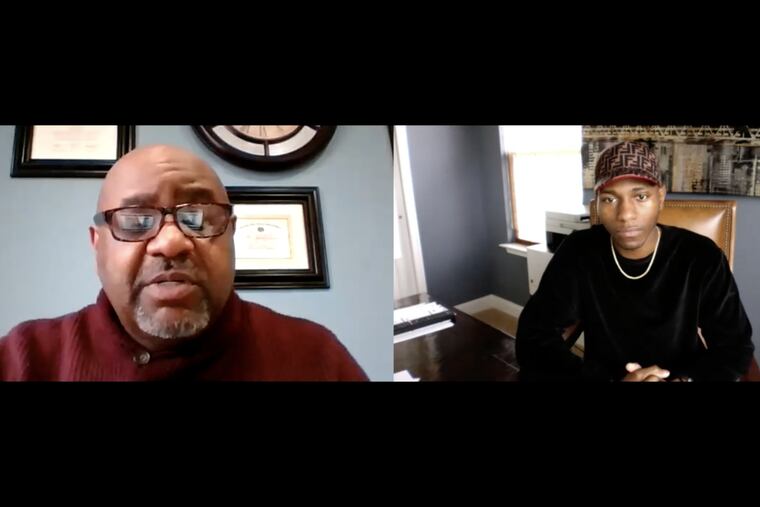A Philadelphia police officer always wondered what happened to the child he’d helped save after a brutal accident. Then the two met.
The officer and father of four said he wasn’t looking for any attention. Nothing he did that day was heroic, he insisted. A child was in trouble. Lots of people tried to help. He was happy to know that the boy had grown up to have a good life.

On Nov. 27, 1996, Philadelphia Police Officer Curtis Ghee had just stepped off the escalator at a North Philadelphia SEPTA subway station when he heard a scream.
He turned and saw a distraught woman on the escalator he’d just gotten off, holding up a young boy. The child’s foot — gone.
Ghee, 51, was off duty, but he ran to a nearby police wagon and asked for help. He and another man scrambled to a vendor’s stand, grabbed one of the scarves that were for sale, and tried to fashion it into a makeshift tourniquet on the child’s leg as they waited for help to arrive.
And then, having done what he could, Ghee walked away.
In the years since, he often thought about reaching out to the boy, who was only 4 at the time, and his mother, who had screamed for help that day.
He scanned a few of the headlines that for years dominated news about the child, as litigation revealed that SEPTA had been aware that its faulty escalator posed a safety hazard.
“I just always wondered what happened to the little guy,” he said.
But life and work took over.
And then, this month, he spotted my story about Shareif “Reef” Hall, the child he had helped. Hall is now 27 — about the age Ghee was that fateful day — and is an aspiring model and entrepreneur.
As the story recounted, it’s been a long road for Hall, who struggled to come to terms with his injury. But the little boy who spent years trying to hide his leg is now a resourceful young man using his prosthetic as a billboard of sorts to promote products — and the message that a disability is a difference to be celebrated.
Not long after the story was published, Ghee’s wife, Falesha, also a Philadelphia police officer, called me. She had been hearing the story of the little boy on the escalator since she’d first met her husband. And now, finally, here were some answers.
When I got in touch with Curtis Ghee, the veteran officer and father of four said he wasn’t looking for any attention. Nothing he did that day was heroic, he insisted. A child was in trouble. Lots of people tried to help.
He was happy to know that the boy on the escalator had grown up to have a good life.
But, he conceded, what he saw that day has stayed with him. In many ways, it set the course for him to eventually become a peer counselor for the Police Department’s Employee Assistance Program.
“I must have told this story a thousand times, no exaggeration, when talking to recruits about what they’re going to see on the streets,” he said. “I tell them it’s all about how they process it.”
In 1996, when he’d been on the job for about four years, he said, there wasn’t much talk about the treatment of trauma for officers, the way there is now.
He’s fine, he said. He’s seen a lot on the job, though he still ranks the Hall incident as one of the worst. His heart still races any time he sees a young child on an escalator.
“It just never went away," he said.
As he spoke, I thought of Hall and how he wanted more than anything else to use his disability to make an impact on other’s lives. And here was a man whose life he’d impacted all these years ago without even realizing it.
Because of the coronavirus, a face-to-face meeting of the men was impossible. So I set up a virtual one, hoping it wouldn’t be too awkward. They were strangers. As we’re learning, even the best technology is a poor replacement for human connection.
I had nothing to worry about.
Ghee’s face glowed when Hall’s image popped up on the call.
“It’s definitely a blessing to be able to see you again,” Hall said.
“I’m just so grateful to see that you are doing well, you’re OK,” Ghee said, smiling.
The men talked for more than an hour.
Ghee told him about that awful day, of which Hall has little memory. “I was shy of four years [on the job] when I remember coming up the escalator,” Ghee said. “I was the first one out, and I took maybe three steps when I heard a scream from a woman. I turned around and she was holding you up, and your foot…."
The memory seemed to take his breath away.
“I just saw what I saw,” he said.
Hall shared how he struggled with his injury but had come out on the other side, now using his disability to show that what makes you different from others makes you unique.
“I had to accept something that I can’t change,” he told him.
“I’m proud of you,” Ghee told him.
They vowed that this wouldn’t be the last time they spoke.
“I’m so looking forward to meeting you in person,” Ghee said.
And what a gift that reunion will be.